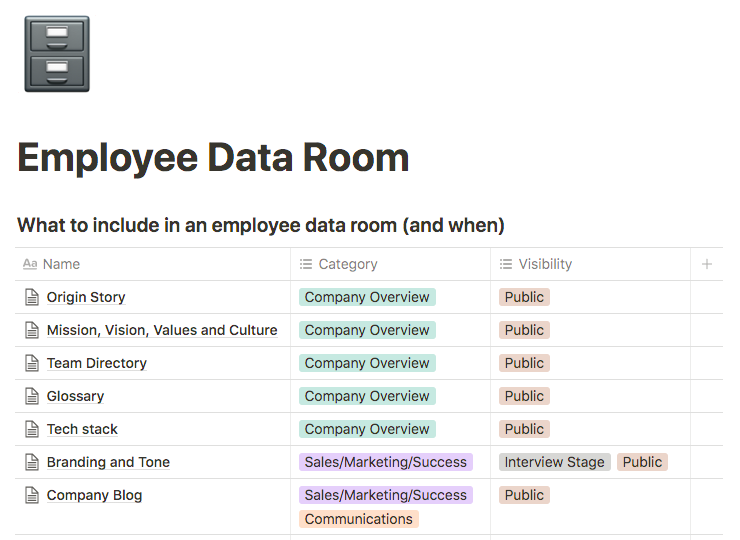Think about the last time you raised capital. It was likely a pretty intensive process (although maybe less intensive than you expected in the current market). One of the established norms when raising capital from VCs is full transparency. In that spirit, you likely freed yourself and your team up for conversations about your goals, your motivations and your tactics. You might have flipped your investors a login to your company dashboard or customer support platform. And you definitely prepared some sort of data room so investors could dig into the specific aspects of your business that interested them most.
Now think about the last time you hired an employee. It was likely a pretty intensive process on their part—but how much transparency did they get towards your company-wide goals and values, individual team members’ work styles, and the state of the business?
When startups convince an employee to join, that employee is essentially investing in the company. They’re investing their time, skills, reputation and the opportunity cost of working elsewhere. Crucially, they’re also only making one investment. Your VCs have a portfolio—your employees have chosen a portfolio of one.
When recruiting, startups tend not to treat prospective employees the same way they treat prospective investors. The vast majority of time is spent questioning the employee, not answering questions. This is especially true for engineers where the conversation doesn’t always naturally turn to business context.
We think that’s backwards. It’s a talent-scarce market right now, and recruiting processes need to evolve to reflect that. Ultimately employees have leverage, and they want to work at companies that treat them as partners who founders can learn from.
This is starting to change, with a new generation of startups leaning into transparency and treating hiring more like relationship building. We’re inspired by companies like Actiondesk, who opted to humanize their About page by referencing the thought leaders they follow and admire on Twitter, podcasts they listen to, where they’ve lived, and the team’s professional likes and dislikes.
Companies like Quorum are emphasizing the potential for growth that new hires will have, in recognition that while they’re hiring someone to solve today’s problems, there is a never-ending stream of new challenges that follow. Their postings include a section that speaks to the “job after this role.” It details how the role might evolve and the different avenues this hire could choose to pursue, and recognizes that entrepreneurial early hires might choose to launch something of their own. Being transparent about how the role will shape and evolve gives top performers comfort that when they’re skilled and collaborative, they will have the potential to shape a role that suits them as they grow individually.

Commit Data Room
At Commit, we build a data room for every startup partner we work with. Our data room covers metrics, perks and tech stack, but also engineering philosophy, founder-market fit, evidence of success, and why we’re excited about the market opportunity. For now these data rooms are only available to our startup partners, but we’ve open-sourced a guide on what to include in an employee data room, which you can find here. Happy hiring!
Sarah Marion leads Founder Partnerships at Commit. She’s spent her career collaborating with early stage founders as they solve valuable problems.
